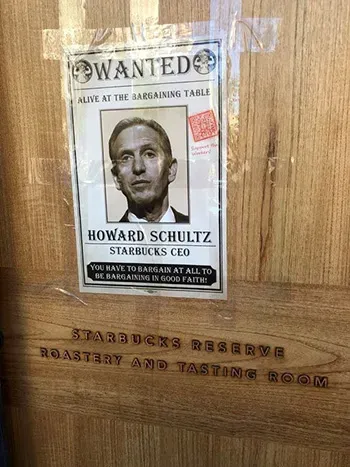Seattle Starbucks workers went on strike July 17, shutting down the company's flagship roastery at 1124 Pike Street.
Workers at the store voted to unionize on April 24, but they say the company has refused to negotiate a contract with them. Starbucks says that the election was improperly organized – although it was carried out under the supervision of the National Labor Relations Board, the federal agency charged with enforcing labor laws.
"Our decision to join a union was because we have always known that partners deserve a seat at the table," the Starbucks Reserve Roastery workers wrote in their notice of strike.
"[It was] to be seen as equals, as business partners engaging in a mutually beneficial agreement of labor – not to have our record-profit be taken from us unfairly as we are worked harder than ever, and, with recent record inflation, paid even less."�
In addition to closing down the roastery, workers picketed at other Starbucks locations and hung up wanted posters featuring the face of Starbucks CEO Howard Schultz.
"Wanted alive at the bargaining table," the posters read. "You have to bargain at all to be bargaining in good faith."
"Good faith bargaining," defined as a sincere effort to reach agreement on a labor contract, is required by federal law. The point is to prevent employers from stalling negotiations till their employees become demoralized and quit their new union.
That's exactly what Starbucks workers accuse the company of doing. Starbucks company spokespeople, however, say that bargaining a contract would be an admission that they accept the results of the union election – something they are unwilling to do.
The company objects to the fact that the NLRB allowed mail-in voting as a precaution during the height of the COVID pandemic. Only in-person votes should have been allowed, Starbucks executives claim.
In response to COVID concerns, the NLRB established alternative voting procedures for all union elections in the country. The Starbucks case is now making its way through the federal appeals process, but workers say the election outcome is not in doubt and the employer is obligated to bargain a contract with them.
The Seattle Starbucks Reserve Roastery was opened in 2014, and from the beginning was intended to be the company's flagship location. Similar roastery stores have been opened in other cities.
According to Starbucks public relations, the roastery is "the fulfillment of a decades-long dream – an homage to our relentless pursuit of coffee innovation that will create for our customers the most immersive, sensory demonstration of how we source, roast and craft the finest coffee from around the world."
The first Seattle location to unionize was a Starbucks on Broadway and Denny in late March of this year.�So far, 11 Starbucks locations in Seattle have voted to unionize. Since December 2021, when the first U.S. Starbucks location voted to unionize, more than 100 other locations have followed suit.


